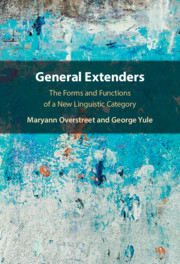Book contents
- General Extenders
- General Extenders
- Copyright page
- Contents
- Tables
- Acknowledgments
- Abbreviations
- 1 Introduction
- 2 Referential Function and Categorization
- 3 Interpersonal Function and Intersubjectivity
- 4 Personal Function and Subjectivity
- 5 Textual Function and Turn Construction
- 6 Historical Development and Change
- 7 Social Marking and Variation
- 8 In Different Languages
- 9 In Learner Language and Language Teaching
- 10 Reflections and Projections
- Notes
- References
- Index
2 - Referential Function and Categorization
Published online by Cambridge University Press: 20 August 2021
- General Extenders
- General Extenders
- Copyright page
- Contents
- Tables
- Acknowledgments
- Abbreviations
- 1 Introduction
- 2 Referential Function and Categorization
- 3 Interpersonal Function and Intersubjectivity
- 4 Personal Function and Subjectivity
- 5 Textual Function and Turn Construction
- 6 Historical Development and Change
- 7 Social Marking and Variation
- 8 In Different Languages
- 9 In Learner Language and Language Teaching
- 10 Reflections and Projections
- Notes
- References
- Index
Summary
Chapter 2 presents a review of earlier studies that were mostly based on the assumption that general extenders are used with a referential function, are content-oriented, signal categorization and can be analyzed as set-marking tags or vague category identifiers. In the clearest cases, which are typically longer forms, they can be analyzed in terms of semantic features, shared with an antecedent, that identify the category involved. In other cases, there may be reference to an ad hoc category, also described as a non-lexicalized category, rather than one that is already lexicalized. The use of adjunctive forms as list completers is also normally interpreted in terms of set-marking.Adjunctive forms are also shown to be indicators of intertextuality. Long forms described as SKT tags incorporate reference to a "kind," indicating that classification or categorization is being signaled. A final section is dedicated to specific extenders, typically used with clear referential function.
Keywords
- Type
- Chapter
- Information
- General ExtendersThe Forms and Functions of a New Linguistic Category, pp. 22 - 42Publisher: Cambridge University PressPrint publication year: 2021

